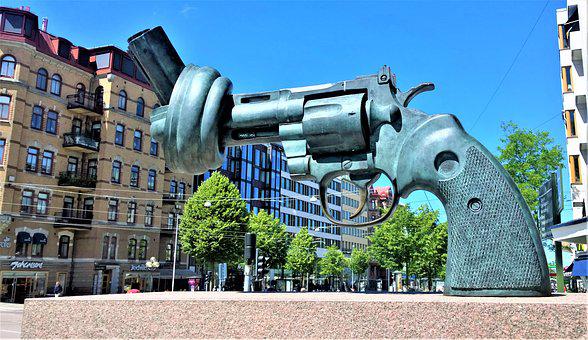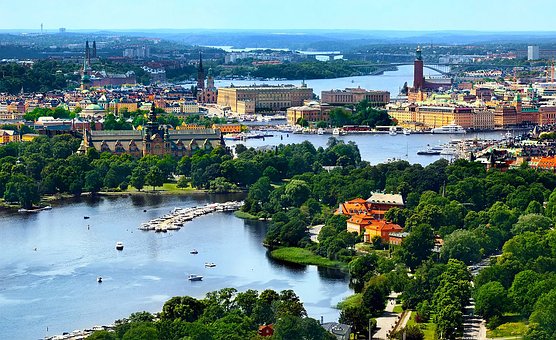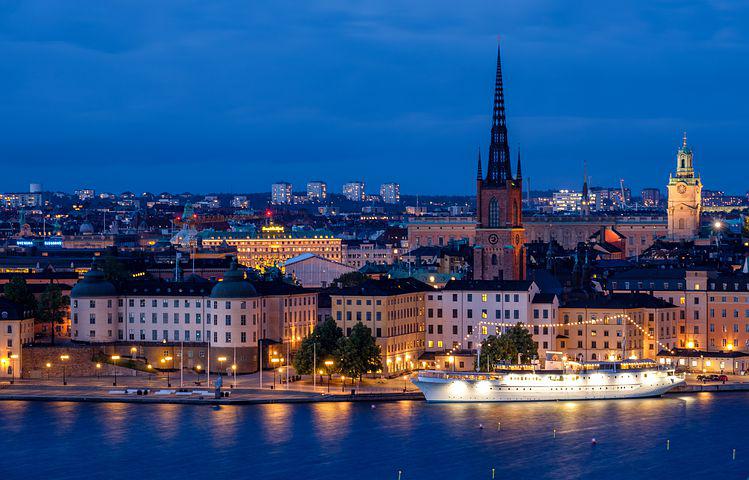Individuals considering a move to a different country may have thought about a potential move to Sweden.
This country is considered one of the most desirable places to live globally.
Not only is the landscape breathtaking and colorful, but the lifestyle, people, and proximity to nearby countries also make it one of the best places to live for many.
However, like any other country, there are some downsides to living in Sweden.
Keep reading to learn more about the benefits and drawbacks of this European country to help you decide if it is the right move for your needs.

Contents
Pros of Living in Sweden
There are considerable benefits for individuals who decide to live in Sweden.
Consider these top reasons why it is one of the most sought-after places to live globally.
1. Great Public Transportation
Sweden has great public transportation that is expertly woven throughout the cities and suburbs.
Individuals who wish to get around from one city to another or from the suburbs to the city and back for work or other endeavors can easily hop on a tram, train, bus, or other mass transit option.
This area is known for being much safer than other cities and has less congestion and more direct routes with fewer stops to help cut down on transit time.
Individuals who do not have a vehicle will not find it much of a hassle if they live anywhere near a major city or a suburb of a city.
However, individuals living in remote areas will need a vehicle to get to urban areas.
2. Incredible Standard of Living
Sweden has one of the best standards of living, if anywhere in the world.
There is very little poverty and almost no homeless individuals living in the country.
Plenty of programs and systems have been installed that work in conjunction with the government to ensure that residents have a better-than-average standard of life and many additional opportunities offered to them for little to no cost.
Many of the standards of living that are expensive in the United States are not an issue for those who live in Sweden.
Healthcare is low cost or free, schools may be free or low cost depending on the education level, and the pay rate is high for almost any job.
Add to that the moderate cost of housing, utilities, and food, and it is a recipe for a high standard of living for nearly everyone.
3. Scenic Landscapes
Sweden has gained worldwide notoriety for having some of the most scenic landscapes anywhere in the world.
It is known for lush green valleys, and some of the cleanest water to be found anywhere.
Additionally, Sweden takes the cleanliness and beauty of its natural landscape seriously and enacts measures to ensure it stays that way and it is free from pollution and other harmful factors.
Anyone wanting to see beautiful landscapes everywhere they look will be dazzled by Sweden anywhere in the country.
4. Lack of Pollution
Sweden and the other countries in Scandinavia are serious about controlling pollution in their country.
There are strict laws in place by the government, and they prohibit industries from disposing of chemicals in a way that will affect the natural environment.
There are also laws in place for handling domestic waste and other byproducts that may contribute to pollution.
Because there are so many regulations, Sweden is one of the cleanest and most healthy environments in the world.
5. Clean and Scenic Towns
As mentioned, Sweden is notoriously clean, and its towns are filled with scenic views and incredible European architecture.
Anyone looking for somewhere to live that has breathtaking views and is beautiful at every turn of the corner will love living in Sweden.
6. Top-Notch Healthcare
Sweden has some of the most accessible and comprehensive healthcare available worldwide.
It strives to provide its residents with the best medical services without cost to the individual.
Because of the abundance of top-quality health care for little to no cost, individuals have a longer lifespan and fewer health concerns over their lifetimes.
Anyone looking for a place to live with exceptional health care without struggling to pay for insurance should consider living in Sweden.
7. Incredibly Inexpensive or Free Education
Sweden is known for its high-quality free education for its citizens.
However, if you move to Sweden and do not become a citizen, you may have to pay for your higher education, such as college or graduate school.
The grade schools and high schools are free and provide a world-class education for all residents.
8. World-class Working Conditions
One of the highlights of living in Sweden is its relaxed and fair working conditions.
Individuals working in Sweden do not keep a 40-hour work week but manage to have higher productivity levels because workers have time to enjoy themselves with their families and do the things they love.
There are also plenty of vacation opportunities, sick days, and time off for special occasions and holidays.
There is even ample time for women to spend with their newborn children on paid leave.
Cons of Living in Sweden
Sweden offers many benefits to its citizens or individuals who decide to move to the country, but some downsides to living there are important to understand before deciding if it is right for your lifestyle.
1. High Taxes
Sweden has a very high tax rate to help support its various public and government projects.
These high taxes are used to fund things such as healthcare, schools, and public programs.
Although Sweden may have a reasonable cost of living, it is essential to be sure to understand how taxes work, the deadlines for preparing them, and how much they will be.
2. Out of Pocket Higher Education for Non-Citizens
If you aren’t a citizen of Sweden, you’ll need to be sure you can pay for your higher education or college.
Although Sweden provides free top-notch college for its citizens, individuals who move from other countries must pay out of pocket.
It is also important to understand that becoming a citizen of Sweden is very difficult and requires extensive effort.
3. It’s Difficult to Purchase Alcohol
It is difficult to purchase alcohol for personal consumption in Sweden.
There are only certain days and particular locations that are allowed to serve alcohol over 3.5%.
Before moving to Sweden, learn more about the laws governing alcohol purchases and consumption to avoid surprises.
4. Unusual Weather Conditions
Because of Sweden’s latitude, there are more hours of darkness than sunlight.
During some parts of the year, Sweden may get up to 6 hours of sunlight per day for a portion of the year.
However, there are long periods of darkness to expect if you plan to move to Sweden.
Individuals who live in this area take measures to prevent seasonal effects disorders, such as purchasing UV lamps and ensuring they get high doses of vitamin D.
5. No Major Cities
Sweden doesn’t have major cities like the United States.
The largest city currently is Stockholm, with over $980,000 residents.
Well, this makes it somewhat population-dense in areas.
It is still not as large as many cities, individuals, and other countries were used to before moving to Sweden.
It is important to understand, however, that there are areas of Sweden where congestion from traffic and foot traffic can be an issue, regardless of the size of the city.
6. Difficult to Make Friends
The people who live in Sweden are not as open and friendly or as welcoming as individuals from other areas in the world.
People tend to be reserved and keep to themselves, making becoming acquainted with people who live there or even making new friends challenging.
It may take several months and some effort to connect with people who live there.
The best way to make friends in Sweden is to join others in hobbies or community activities.
7. Conservative Living Expectations
Sweden is home to many unwritten rules to live by that it expects each individual who lives there to abide by to avoid conflicts.
Because of the unwritten societal expectations, or Jante’s Law, Society in Sweden works very differently from elsewhere, such as in the United States.
Individuals are expected to be humble and not be too ambitious or boastful.
Before moving to Sweden, learn more about their culture and way of life to avoid problems or raised eyebrows.

Pros and Cons of Living in Sweden – Summary Table
| Pros of Living in Sweden | Cons of Living in Sweden |
|---|---|
| 1. Great Public Transportation | 1. High Taxes |
| 2. Incredible Standard of Living | 2. Out of Pocket Higher Education for Non-Citizens |
| 3. Scenic Landscapes | 3. It's Difficult to Purchase Alcohol |
| 4. Lack of Pollution | 4. Unusual Weather Conditions |
| 5.Clean and Scenic Towns | 5. No Major Cities |
| 6. Top-Notch Healthcare | 6. Difficult to Make Friends |
| 7. Incredibly Inexpensive or Free Education | 7. Conservative Living Expectations |
| 8. World-class Working Conditions |
Sweden Safety Overview
READ THE FULL REPORT: Sweden Safety Review
Safety Index:
- OVERALL RISK: LOW
- TRANSPORT & TAXIS RISK: LOW
- PICKPOCKETS RISK: MEDIUM
- NATURAL DISASTERS RISK: MEDIUM
- MUGGING RISK: LOW
- TERRORISM RISK: MEDIUM
- SCAMS RISK: MEDIUM
- WOMEN TRAVELERS RISK: LOW
Frequently Asked Questions
What is the highest elevation in Sweden?
The highest elevation is 6,912 ft at Kebnekaise’s case’s northern peak.
This peak is considered to be the highest in the Nordic region.
What is the crime rate in Sweden?
The crime rate in Sweden is very low at approximately 150,000 crimes per 1 million inhabitants.
This statistic has remained fairly steady over the last decade.
That means that it’s easy to pinpoint the more dangerous areas and avoid criminal activity if you plan on moving to Sweden in the near future.
A bit of Internet research can help you decide which areas are the safest and have the lowest crime rate.
What are the average high and low temperatures in Sweden?
The temperature in Sweden is around 27° F.
However, Sweden is known for having intense winter storms and can have extremely low temperatures.
Sweden has very mild summers with average temperatures ranging between 68 and 77° F.
What is the average monthly cost of living in Sweden?
The average monthly cost of living without rent for a single individual in Sweden is $832.
The estimate for a family of four falls to around $3,000 per month.
What is the average precipitation in Sweden?
The average precipitation in Sweden falls between 20 and 31inches per year.
Because of these measurements, Sweden is considered one of the drier countries in the world.












All of the above pros and cons seem to have contributed to the Swedish government being able to avoid having a big lockdown during the COVID crisis, whereas in the UK the authorities would never have been able to manage this. It is also less easy to emigrate to Sweden from the UK without some form of prearranged job, making the idpea of going there somewhat impractical. The real problem, though, is that unless everything in life has really seriously failed for somebody in UK or USA, the high taxes will leave them worse off overall.
I live in sweden and turn the natural disasters risk to low and everything else seems about right.
I would really love to relocate to sweden . I am from Kenya.